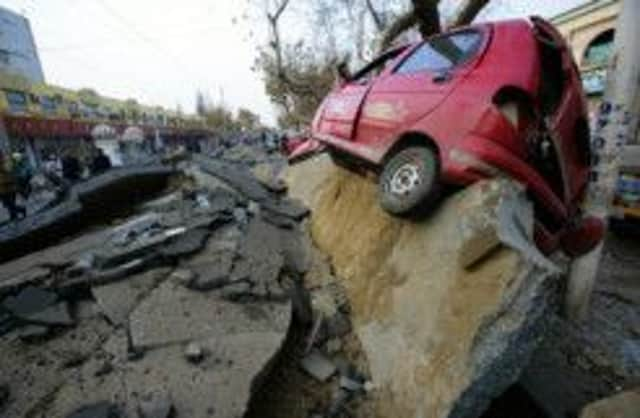China: Oil giant apologises after blast kills 47


Officials yesterday warned the death toll from Friday’s incident were likely to rise.
Authorities have ruled out terrorism but say the incident is under investigation.
Advertisement
Hide AdAdvertisement
Hide AdThe blast – reportedly China’s worst industrial accident this year – has left at least 136 people injured.
Last night, ten people remained critically ill in hospital with life-threatening injuries.
More than 100 firefighters spent hours dousing the blaze after leaking oil ignited in a series of explosions.
About 18,000 residents have been evacuated in the wake of the blasts, and power was restored to all except two residential neighbourhoods, officials said.
The explosions ripped slabs of pavement and photographs showed bodies, overturned vehicles and shattered windows in nearby buildings in Qingdao, situated in the eastern Shandong province.
Black smoke rose above gigantic fuel silos and continued to darken much of the sky over the area last night.
Part of the pipeline ruptured and leaked for about 15 minutes on to a street and into the sea before it was shut off.
Hours later, as workers cleaned up the spill, the oil caught fire and exploded in two locations, the city government said.
Advertisement
Hide AdAdvertisement
Hide AdThe pipeline is owned by Sinopec, China’s largest oil refining company.
Sinopec’s ongoing expansion of petrochemical projects have been criticised by members of the public and the blast have added to growing concern about safety and environmental risks at the plant.
Fu Chengyu, chairman of Sinopec, yesterday issued a public apology, according to a company statement.
He said that Sinopec would collaborate with a state council investigation group to find out the exact cause of the fatal incident.
“We will investigate the incident with responsibility and give timely reports,” another Sinopec statement said.
The Qingdao Environmental Protection Bureau said barriers had been set up to contain the oil as it spread into the harbour, but that a mixture of gas and oil from a storm sewer exploded and caught fire, turning the port into a sea of flame.
More than 32,000 square feet of sea surface is estimated to have become contaminated as a result of the explosion, the city government said.
Authorities said the oil had seeped into underground utility pipes, which could have been a factor in the blasts.
Advertisement
Hide AdAdvertisement
Hide AdOfficials assured the public the explosions did not affect any petrochemical plant or military facilities in the coastal district and that air quality remained good after the disaster.
The Beijing News reported how a local resident surnamed Gao told how he was driving past Qingdao’s Huangdao district when he felt the force of the blasts.
Seconds later he realised the ground in front of him had fractured from the impact of the explosion.
He was reported as saying: “The air stank of oil, many, many cars on both sides of the road were overturned and there was dark smoke rising in the distance. It felt like an earthquake had struck, and I was unable even to cry out.”
He said there was chaos on the street as people ran, panicking, in all directions, many fearing for their lives.
President Xi Jinping has told local officials to continue their search for any survivors as well as for the bodies of people still feared missing.
The leaking pipeline had been operating since 1986, with an annual oil transfer capacity of 10 million tonnes, officials revealed.
In June, 121 people were killed in China after a chicken factory fire caught fire in Jilin in the north-east of China.